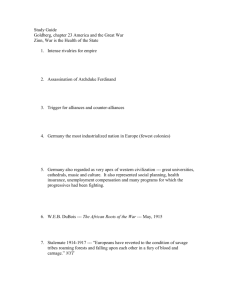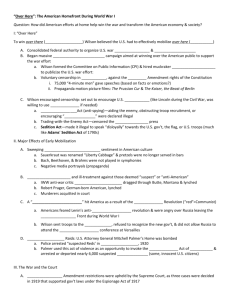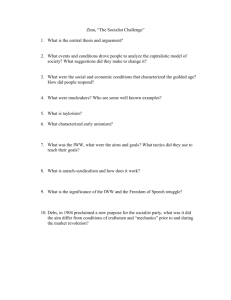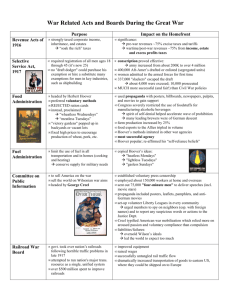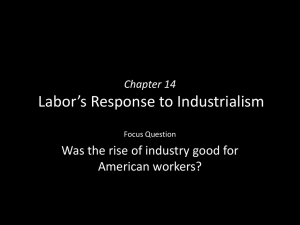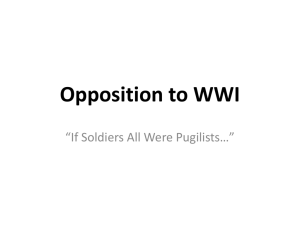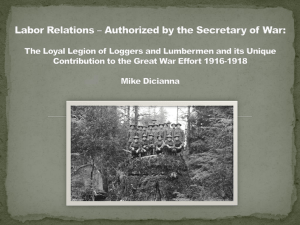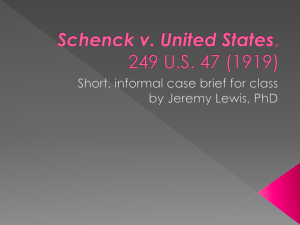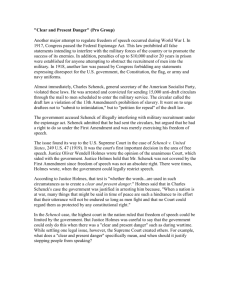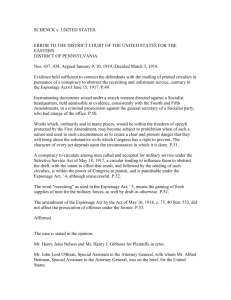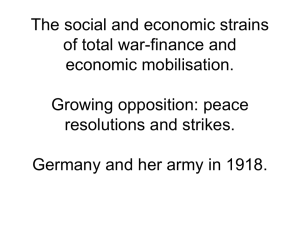Study Guide 9 The Progressives Confront Industrial Capitalism and
advertisement
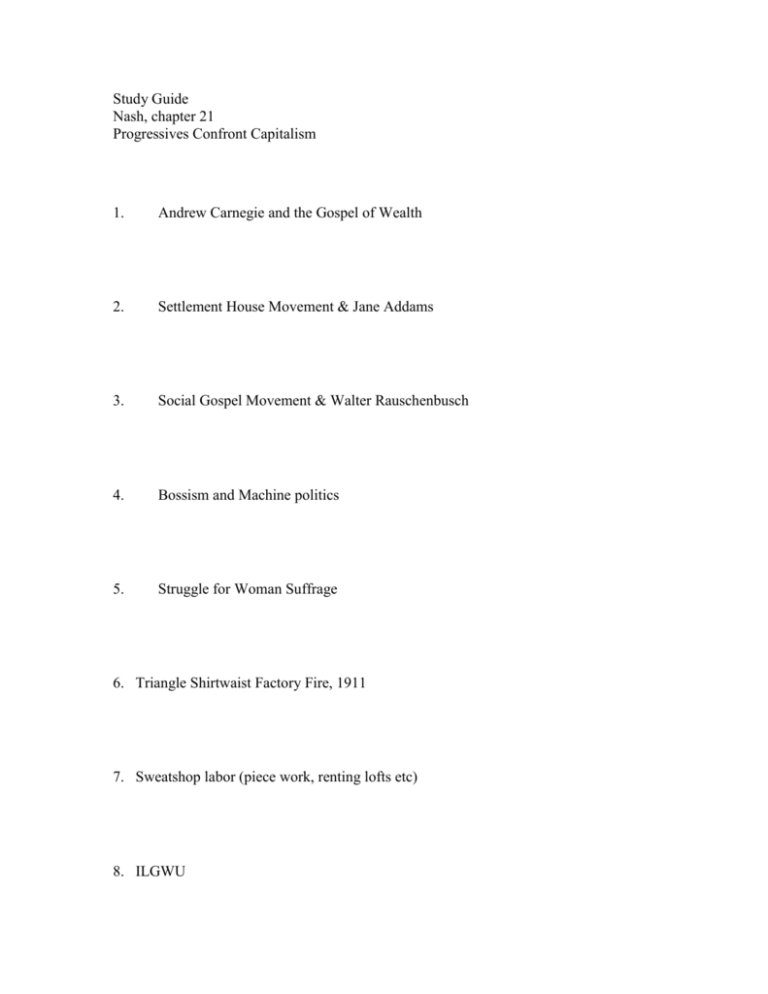
Study Guide Nash, chapter 21 Progressives Confront Capitalism 1. Andrew Carnegie and the Gospel of Wealth 2. Settlement House Movement & Jane Addams 3. Social Gospel Movement & Walter Rauschenbusch 4. Bossism and Machine politics 5. Struggle for Woman Suffrage 6. Triangle Shirtwaist Factory Fire, 1911 7. Sweatshop labor (piece work, renting lofts etc) 8. ILGWU 9. Uprising of the 20,000 10. Progressivism (diverse, complex, often contradictory trends) 11. Roosevelt as “trustbuster”? (e.g., Standard Oil) 12. Roosevelt mediates 1902 Anthracite Coal Strike (Pennsylvania) 13. 1912 Presidential Election (Wilson, Taft, Roosevelt, Debs) 14. Rising tide of socialism (radical movements) sets the agenda 15. Socialist Party of America (formed 1901) 16. Debs bids for the Presidency 17. Anarchism as political philosophy 18. Emma Goldman 19. IWW (1905 - Debs, Haywood, Goldman, Mother Jones) “One Big Union” 20. Bread and Roses strike 1912 21. Ludlow Massacre, 1914 22. Muckrakers 23. Upton Sinclair The Jungle (main themes) 24. Meat Inspection Act (1906) &Pure Food and Drug Act (1907) 25. Middle class reformism (gambling, alcoholism, prostitution etc.) 26. Muller v. Oregon (1908) 27. National Child Labor Committee 28. Lewis Hine 29. Child labor state by state Study Guide Nash, The Great War 1. Intense rivalries for empire 2. Assassination of Archduke Ferdinand 3. Trigger for alliances and counter-alliances 4. Germany the most industrialized nation in Europe (fewest colonies) 5. Germany also regarded as very apex of western civilization --- great universities, cathedrals, music and culture. It also represented social planning, health insurance, unemployment compensation and many programs for which the progressives had been fighting. 6. W.E.B. DuBois --- The African Roots of the War --- May, 1915 7. Stalemate 1914-1917 --- “Europeans have reverted to the condition of savage tribes roaming forests and falling upon each other in a fury of blood and carnage.” NYT 8. Total war 9. Eric Maria Remarque 10. Role of colonies (heavy taxes, low prices, forced recruitments) 11. German Schlieffen plan 12. The Western Front --- neutralization of the frontal assault --- how? Although the great advantage of trench warfare lay with the defense, both sides adhered to outdated army traditions and relied on massive, head-on infantry assaults. As attack after attack failed, the toll on human lives grew rapidly, and the Western Front became an area of bloody stalemate. 13. First battle of the Marne, August-September, 1914 --- half million casualties inside two weeks 14. Wilson administration and “neutral rights.” --- Balance of power and commerce 15. British naval blockade 16. International law (Cruiser laws) and belligerent ships --- illegal arming of merchant vessels 17. Unrestricted Submarine warfare 18. Sinking of Lusitania (May 1915) --- 128 American dead 19. American public’s reaction to the war in Europe (and reaction to Lusitania) 20. U.S. “neutrality” (unprecedented war profiteering) --- Resignation of Bryan 21. U.S. and “war preparedness” --- Army Reorganization Bill 22. Anti-war sentiment in the U.S. “I didn’t raise my boy to be a soldier” 23. Mexico --- by 1910, Americans controlled 75 percent of the mines, 70 percent of the rubber, and 60 percent of the oil in Mexico. 24. Wilson and the Mexican Revolution --- backing Caranza against Villa and Zapata. In January of 1917, just as war seemed inevitable, Wilson agreed to recall troops and to recognize the Caranza government” --- Why? 25. Election of 1916 --- Wilson supports part of the progressive agenda --- workers compensation and child-labor laws, federal loans for farmers and 8 hour day for interstate railroad workers. --- Wilson wins much of the progressive vote. 26. Double revolution in Russia, 1917 27. Declaration of war April 1917 ---A million troops were needed, but in the first six week after the declaration of war only 73,000 volunteered. Congress voted overwhelmingly for a draft. 28. Destabilization of eastern front 29. Destabilization of Western Front 30. Tipping the balance of power --- “too proud to fight”? 31. Mutiny in French army (54 of 100 divisions) 32. German push --- American intervention (impact on German Spring offensive) 33. War resistance --- IWW, socialists, left liberals 34. War Preparedness Day bombing ---- Summer 1916 35. Zimmerman note, April 1917 36. American propaganda (Creel Committee --- four minute men) 37. The draft --- 75 percent of soldiers who served in the war were drafted 38. Espionage Act, June 1918 (later, Sedition Act) --- The Espionage Act provided imprisonment of up to 20 years for persons who aided or who “willfully cause . . . insubordination, disloyalty, mutiny or refusal of duty in the military . . . forces of the United States.” The Sedition Act prohibited disloyal, profane, scurrilous, or abusive remarks about the form of government, flag, or uniforms of the United States. 39. War resistance ---- Two months after the [Espionage Act] was passed, a Socialist named Charles Schenck was arrested in Philadelphia for printing and distributing fifteen thousand leaflets that denounced the draft law and the war. Conscription, it said, was “a monstrous against humanity in the interests of the financiers of Wall Street.” Schenck was indicted, tried, found guilty, and sentenced to six months in jail for violating the Espionage Act (it turned out to be one of the shortest sentences given in such cases). Schenck appealed, arguing that the act, by prosecuting speech and writing, violated the First Amendment: “Congress shall make not law . . . abridging the freedom of speech, or of the press . . .” The Supreme Court’s decision was unanimous and was written by the famous liberal Oliver Wendell Holmes. Was Schenck protected by the First Amendment? Holmes said: “The most stringent protection of free speech would not protect a man from falsely shouting fire in a crowded movie theatre and causing a panic . . . The question in every case is whether the words used are used in such circumstances and are of such a nature as to create a clear and present danger that they will bring about the substantive evils that the Congress has a right to prevent.” 40. Case of Eugene V. Debs. The case of Eugene Victor Debs soon came before the Supreme Court. In June of 1918, Debs visited three Socialists who were in prison for opposing the draft, and then spoke, across the street from the jail, to an audience he kept enthralled for two hours. He was one of the country’s great orators, and was interrupted again and again by laughter and applause: “They tell us that we live in a great free republic; that our institutions are democratic; that we are a free and self-governing people. That is too much, even for a joke . . . Wars throughout history have been waged for conquest and plunder . . . and that is war in a nutshell. The master class has always declared the wars; the subject class has always fought the battles.” (Zinn) 41. Jane Addams (Woman’s Peace Party) --- Addams foresaw World War I. In 1915, in an effort to avert war, she organized the Women's Peace Party and the International Congress of Women. This latter organization met at The Hague and made serious diplomatic attempts to thwart the war. When these efforts failed and the U.S. joined the war in 1917, criticism of Addams rose. She was expelled from the Daughters of the American Revolution, but it did not slow her down. In 1919 she was elected first president of the Women's International League for Peace and Freedom, a position she held until her death. She was co-founder of the American Civil Liberties Union and the NAACP. These positions earned her even more criticism than her pacifism. She was accused of being a socialist, an anarchist and a communist. 42. Jeannette Rankin --- In 1914, Jeannette Rankin led a successful drive for women's voting rights in her native state of Montana and in 1916, running in the Republican party, was elected to the U. S. House of Representatives. This was four years before women had the right to vote nationwide. Miss Rankin did not respond when her name was called in the roll call on the declaration of war. On the next roll call she stood up: “I want to stand by my country but I cannot vote for war. I vote no.” 43. Banning of the American Socialist and The Masses. The Masses, a socialist magazine of politics, literature and art, was banned from the mails. It had carried an editorial by Max Eastman in the summer of 1917, saying, among other things: “for what specific purposes are shipping our bodies, and the bodies of our sons to Europe? For my part, I do not recognize the right of a government to draft me to a war whose purposes I do not believe in.” 44. Free Speech? (IWW & Espionage Act) ---- In April of 1918, 101 IWW leaders went on trial for conspiring to hinder the draft and encouraging desertion. One Wobbly man told the court: “You ask me why the IWW is not patriotic to the United States. If you were a bum without a blanket; if you had left your wife and kids when you went west for a job, and had never located them since; if your job had never kept you long enough in a place to quality you to vote; if every person who represented law and order and the nation beat you up, railroaded you to jail, and the good Christian people cheered and told them to go to it, how in hell do you expect a man to be patriotic? This war is a business man’s war and we don’t see why we should go and get shot in order to save the lovely state of affairs we now enjoy.” (Zinn) 45. Emma Goldman sentenced for opposing the draft --- she told the jury: “verily, poor as we are in democracy how can we give of it to the world?” 46. The Nye Committee Hearings 1933-34 --- Senator Gerald Nye of North Dakota revealed that munitions makers had made "huge" profits during W.W.I. They were called the "Merchants of Death." 47. Average American soldier --- Education? Literacy rates? 48. African American soldiers (DuBois on enlistment) 49. War ends, November 1918 --- 48,000 American war dead 50. Domestic impact of the war
